Dacia Duster vs Fiat Panda - Differences and prices compared
Compare performance (158 HP vs 70 HP), boot space and price (16300 £ vs 14100 £ ) at a glance. Find out which car is the better choice for you – Dacia Duster or Fiat Panda?
Costs and Efficiency:
Looking at overall running costs, both models reveal some interesting differences in everyday economy.
Fiat Panda has a somewhat advantage in terms of price – it starts at 14100 £ , while the Dacia Duster costs 16300 £ . That’s a price difference of around 2143 £.
Fuel consumption also shows a difference: Dacia Duster manages with 4.70 L and is therefore slight more efficient than the Fiat Panda with 5 L. The difference is about 0.30 L per 100 km.
Engine and Performance:
Power, torque and acceleration are the classic benchmarks for car enthusiasts – and here, some clear differences start to show.
When it comes to engine power, the Dacia Duster has a clearly edge – offering 158 HP compared to 70 HP. That’s roughly 88 HP more horsepower.
In acceleration from 0 to 100 km/h, the Dacia Duster is significantly quicker – completing the sprint in 9.40 s, while the Fiat Panda takes 13.90 s. That’s about 4.50 s faster.
In terms of top speed, the Dacia Duster performs hardly perceptible better – reaching 180 km/h, while the Fiat Panda tops out at 164 km/h. The difference is around 16 km/h.
There’s also a difference in torque: Dacia Duster pulls significantly stronger with 230 Nm compared to 92 Nm. That’s about 138 Nm difference.
Space and Everyday Use:
Beyond pure performance, interior space and usability matter most in daily life. This is where you see which car is more practical and versatile.
Seats: Dacia Duster offers slightly more seating capacity – 5 vs 4.
In curb weight, Fiat Panda is noticeable lighter – 1055 kg compared to 1377 kg. The difference is around 322 kg.
In terms of boot space, the Dacia Duster offers decisively more room – 517 L compared to 225 L. That’s a difference of about 292 L.
In maximum load capacity, the Dacia Duster performs significantly better – up to 1609 L, which is about 739 L more than the Fiat Panda.
When it comes to payload, Dacia Duster slightly takes the win – 453 kg compared to 365 kg. That’s a difference of about 88 kg.
Who wins the race in the data check?
The Dacia Duster is decisively ahead in the objective data comparison.
This result only shows which model scores more points on paper – not which of the two cars feels right for you.
Costs and Consumption
View detailed analysis
Engine and Performance
View detailed analysis
Dimensions and Body
View detailed analysis

Dacia Duster
Dacia Duster
The Dacia Duster is a no-nonsense compact SUV that delivers rugged practicality and surprisingly comfortable everyday driving without fuss. It might not win any beauty contests, but its honest design, easy-to-live-with cabin and tough attitude make it a smart pick for buyers who want reliable transport without luxury frills.
details



Fiat Panda
The Panda is a charming, no-nonsense city companion that mixes cheerful Italian flair with genuinely useful practicality, making tight streets and daily errands feel less of a chore. Its honest simplicity, clever packaging and a dash of cheeky character make it a smart, low-stress buy for people who prefer sensible perks over showroom flash.
details



Costs and Consumption |
|
|---|---|
|
Price
16300 - 24900 £
|
Price
14100 £
|
|
Consumption L/100km
4.7 - 7.5 L
|
Consumption L/100km
5 L
|
|
Consumption kWh/100km
-
|
Consumption kWh/100km
-
|
|
Electric Range
-
|
Electric Range
-
|
|
Battery Capacity
0.60 kWh
|
Battery Capacity
-
|
|
co2
107 - 124 g/km
|
co2
113 g/km
|
|
Fuel tank capacity
50 L
|
Fuel tank capacity
38 L
|
Dimensions and Body |
|
|---|---|
|
Body Type
SUV
|
Body Type
Hatchback
|
|
Seats
5
|
Seats
4
|
|
Doors
5
|
Doors
5
|
|
Curb weight
1377 - 1455 kg
|
Curb weight
1055 kg
|
|
Trunk capacity
348 - 517 L
|
Trunk capacity
225 L
|
|
Length
4343 mm
|
Length
3635 mm
|
|
Width
1813 mm
|
Width
1643 mm
|
|
Height
1656 - 1659 mm
|
Height
1551 mm
|
|
Max trunk capacity
1414 - 1609 L
|
Max trunk capacity
870 L
|
|
Payload
450 - 453 kg
|
Payload
365 kg
|
Engine and Performance |
|
|---|---|
|
Engine Type
Petrol MHEV, Full Hybrid, LPG
|
Engine Type
Petrol MHEV
|
|
Transmission
Manuel, Automatic
|
Transmission
Manuel
|
|
Transmission Detail
Manual Gearbox, Automated Manual, Dual-Clutch Automatic
|
Transmission Detail
Manual Gearbox
|
|
Drive Type
Front-Wheel Drive, All-Wheel Drive
|
Drive Type
Front-Wheel Drive
|
|
Power HP
115 - 158 HP
|
Power HP
70 HP
|
|
Acceleration 0-100km/h
9.4 - 11.6 s
|
Acceleration 0-100km/h
13.90 s
|
|
Max Speed
180 km/h
|
Max Speed
164 km/h
|
|
Torque
190 - 230 Nm
|
Torque
92 Nm
|
|
Number of Cylinders
3 - 4
|
Number of Cylinders
3
|
|
Power kW
84 - 116 kW
|
Power kW
51 kW
|
|
Engine capacity
1199 - 1789 cm3
|
Engine capacity
999 cm3
|
General |
|
|---|---|
|
Model Year
2025
|
Model Year
2024
|
|
CO2 Efficiency Class
D, C
|
CO2 Efficiency Class
C
|
|
Brand
Dacia
|
Brand
Fiat
|
What drivetrain options does the Dacia Duster have?
The Dacia Duster is offered with Front-Wheel Drive or All-Wheel Drive.




